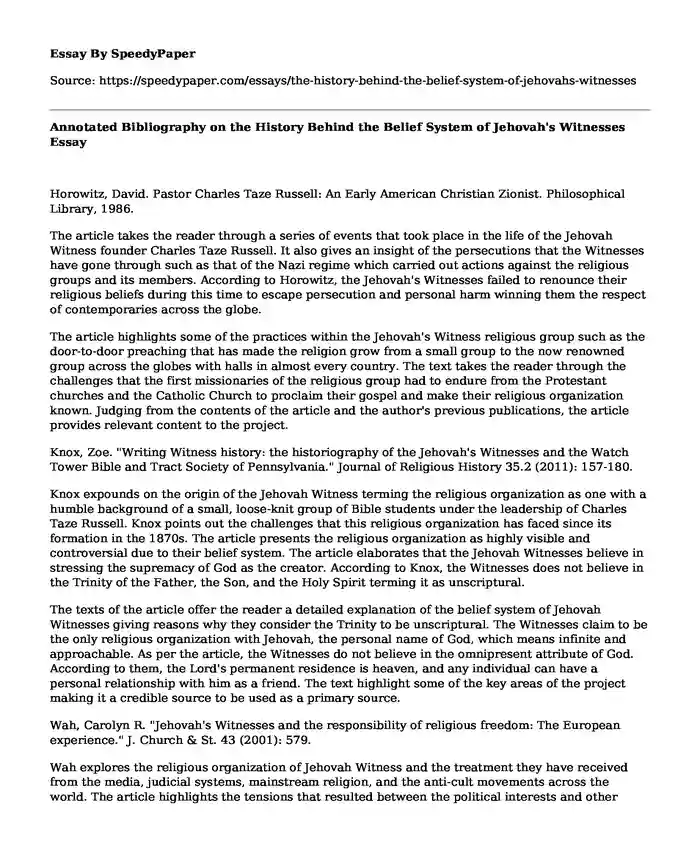Horowitz, David. Pastor Charles Taze Russell: An Early American Christian Zionist. Philosophical Library, 1986.
The article takes the reader through a series of events that took place in the life of the Jehovah Witness founder Charles Taze Russell. It also gives an insight of the persecutions that the Witnesses have gone through such as that of the Nazi regime which carried out actions against the religious groups and its members. According to Horowitz, the Jehovah's Witnesses failed to renounce their religious beliefs during this time to escape persecution and personal harm winning them the respect of contemporaries across the globe.
The article highlights some of the practices within the Jehovah's Witness religious group such as the door-to-door preaching that has made the religion grow from a small group to the now renowned group across the globes with halls in almost every country. The text takes the reader through the challenges that the first missionaries of the religious group had to endure from the Protestant churches and the Catholic Church to proclaim their gospel and make their religious organization known. Judging from the contents of the article and the author's previous publications, the article provides relevant content to the project.
Knox, Zoe. "Writing Witness history: the historiography of the Jehovah's Witnesses and the Watch Tower Bible and Tract Society of Pennsylvania." Journal of Religious History 35.2 (2011): 157-180.
Knox expounds on the origin of the Jehovah Witness terming the religious organization as one with a humble background of a small, loose-knit group of Bible students under the leadership of Charles Taze Russell. Knox points out the challenges that this religious organization has faced since its formation in the 1870s. The article presents the religious organization as highly visible and controversial due to their belief system. The article elaborates that the Jehovah Witnesses believe in stressing the supremacy of God as the creator. According to Knox, the Witnesses does not believe in the Trinity of the Father, the Son, and the Holy Spirit terming it as unscriptural.
The texts of the article offer the reader a detailed explanation of the belief system of Jehovah Witnesses giving reasons why they consider the Trinity to be unscriptural. The Witnesses claim to be the only religious organization with Jehovah, the personal name of God, which means infinite and approachable. As per the article, the Witnesses do not believe in the omnipresent attribute of God. According to them, the Lord's permanent residence is heaven, and any individual can have a personal relationship with him as a friend. The text highlight some of the key areas of the project making it a credible source to be used as a primary source.
Wah, Carolyn R. "Jehovah's Witnesses and the responsibility of religious freedom: The European experience." J. Church & St. 43 (2001): 579.
Wah explores the religious organization of Jehovah Witness and the treatment they have received from the media, judicial systems, mainstream religion, and the anti-cult movements across the world. The article highlights the tensions that resulted between the political interests and other emotion-laden issues that surrounded the formation of the religion. The article expounds on the new religious movement aspect that was taken by Jehovah Witness religious organization for visibility.
In the process, she disputes the continuity of Jehovah Witness as a New Religious Movement based on their belief system and the uninterrupted publications of the Watch Tower magazines. Wah takes into consideration the views of the Student Movement founder, Charles Taze Russell, whose ideologies gave birth to Jehovah Witness. The text in the article offers the reader with the reality check on factors that surrounded the formation and the resulting belief system of the Jehovah Witnesses. The chapters of the text provide a deeper insight into the foundation and the belief system of the Jehovah Witness and can be used by any individual who needs to know more about the religious organization.
Works Cited.
Horowitz, David. Pastor Charles Taze Russell: An Early American Christian Zionist. Philosophical Library, 1986.
Knox, Zoe. "Writing Witness history: the historiography of the Jehovah's Witnesses and the Watch Tower Bible and Tract Society of Pennsylvania." Journal of Religious History 35.2 (2011): 157-180.
Wah, Carolyn R. "Jehovah's Witnesses and the responsibility of religious freedom: The European experience." J. Church & St. 43 (2001): 579.
Cite this page
Annotated Bibliography on the History Behind the Belief System of Jehovah's Witnesses. (2022, Sep 23). Retrieved from https://speedypaper.net/essays/the-history-behind-the-belief-system-of-jehovahs-witnesses
Request Removal
If you are the original author of this essay and no longer wish to have it published on the SpeedyPaper website, please click below to request its removal:
- Entrepreneurship and Innovation - Application Essay Example
- Essay Example on LEED Legal Issues
- The Shattering of the Union - Book Review Essay Sample
- Free Essay Example: Homelessness in the Bay Area
- Free Essay on Marginalization of Animals in Why Look at Animals? by John Berger
- Essay Sample on Europe in the Atlantic World
- Essay Sample on Purchasing Portfolio Theory
Popular categories





